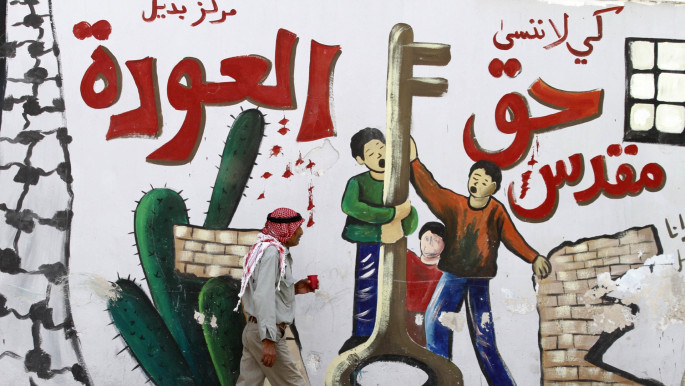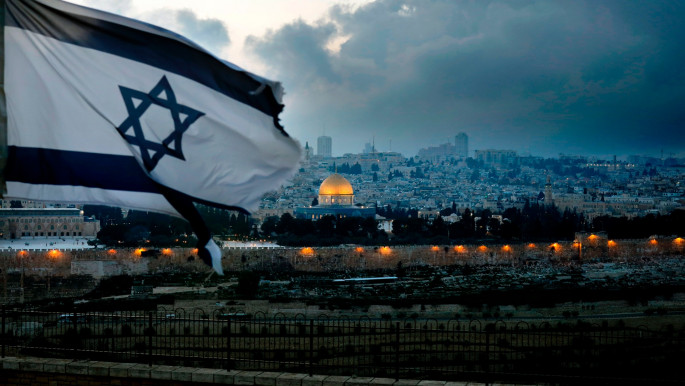Preserving the memory of the Nakba in Palestinian literature
The ethnic cleansing displaced 750,000 Palestinians from their land between 1947 and 1949. In the decades that followed, Palestinian narratives were muted to accommodate the political diplomacy promoted by the international community.
This included a mix of statistics, humanitarian aid and forced dependence which promoted the two-state compromise over the Palestinian people's political rights and memory. One question we should be asking is: how many narratives of the 750,000 displaced Palestinians still survive?
The loss of Palestinian archives as a result of Israel's occupation makes the documentation and preservation of Palestinian oral histories a vital task. The international community knows it is easier to deal with the anonymity of statistics, but Palestinians are challenging this imposed complacency.
Even so, decades of political compromise, notably with regard to Palestinian refugees and their right of return, translates to an ongoing loss which cannot be fully recuperated.
Ramzy Baroud's collection of Palestinian narratives, The Last Earth: A Palestinian Story (Pluto Press 2018), points towards the magnitude of untold stories and the importance of Palestinian memory in understanding the Palestinian people's ongoing Nakba.
 |
Addressing the Nakba through poetry started prior to 1948. It predicted the events which happened in the face of abandonment. Prose came later -Ghassan Zaqtan |
 |
Literature makes inroads into awareness. Reading an external overview of the Nakba is not as powerful as acquainting one's self with the stories of expulsions and massacres. Witnesses of these atrocities have a responsibility to articulate, the least that can be done is to allow the spaces for Palestinian narratives to thrive and be documented.
Ghassan Zaqtan, a Palestinian poet and novelist, spoke to The New Arab about the role literature plays in preserving and imparting Palestinian narratives and memory.
"The Palestinian Nakba is not just a historical event that ended and now exists only within commemorations. The Nakba continues to feed on the suffering of generations of Palestinians who have been displaced under the influence of violence," he said.
 |
|
| Read more: Remembering 72 years of the Nakba in the shadow of annexation |
"It grows in parallel with the lives of more than 6 million refugees who were expelled from their country to refugee camps, and of 5 million others who continue to live under Israel's military occupation, which sustains itself through weapons, oppression and the furnishing of an advanced system of apartheid," he added.
Zaqtan says poetry is the vehicle through which Palestinians first communicated their reality of displacement. "Addressing the Nakba through poetry started prior to 1948. It predicted the events which happened in the face of abandonment. Prose came later," he said.
The continuity of Palestinian trauma and loss is exacerbated by Israel's appropriation, Zaqtan explains. "We are facing a unique situation in history. A people that lost their country – a country that had been developing throughout the centuries in agriculture, industry, trade, printing houses, cinemas and theatres, thriving ports on the south of the Mediterranean, cities abundant in history and 10,000 years of civilisation, the rail network and transportation. The airports. Arts and literature."
"All this forms the bulwark of the infrastructure that the Palestinians created and was then called 'Israel' as a result of colonialism. The Palestinians keep the keys to their homes, but the loss transcends personal property. The Nakba is all of this and it is an ongoing reality, not just a historical artefact."
Zaqtan's novel, Where the Bird Disappeared (Seagull Books, 2018), contains a vivid account of Palestinian displacement. Yahya and Zakariyya, the main characters, enter a cycle that seems endless, "walking through the day, with no goal and idea, only to keep going." Is there a contradiction between the permanence of displacement and the will to return?
 |
In Palestinian literature, return is not just symbolic but also an assertion of revival |  |
"Nothing was left but walking. Everything else was lost. The dawn prayer that preceded in the vineyards of Beit Jala signalled the need to embark on the journey – a necessity to ensure that the place remained although everything around it was changing. It united the past and present, the personal memory and memories of the place, in dense and sequential layers," Zaqtan said.
"For the protagonist, both place and presence are intertwined. It is memory that prompts the return to the place. Are we talking about a contradiction? It is possible, but the only way to discover that is to walk, to return," he added.
Loss is countered by return. In Palestinian literature, return is not just symbolic but also an assertion of revival, as well as providing the link to memory. The rupture endured by Palestinians has generated loss on several levels, including Palestinian narratives.
 |
|
| Read more: The day after annexation: Israel, Palestine and the one-state reality |
"The oral narrations retained their relevance from one generation to the other. Poetry was the earlier form which prevailed with a strong and direct presence since the Nakba, expressing Palestinian identity, nostalgia, as well as transmitting reality and revival through symbolic language," Zaqtan says.
"I was fortunate to be born in this culture – my father, Kalil Zaqtan, was also a poet and I had the opportunity to immerse myself in his library. The poets were close to the Palestinian revolutionary leaders revered in refugee camps. That generation deserved to be known as 'al-Nakba poets'. A decade after the Nakba, it was Ghassan Kanafani who revolutionised literature through prose in the 1960s."
Zaqtan points towards the current trends in preserving Palestinian memory through literature, noting that Palestinians and Arab writers are collectively contributing to the preservation of these narratives.
"There are many names on the scene now, and efforts to document the Nakba's oral history by collecting testimonies and narrations. Civil society organisations are a part of this task, and there is also the research undertaken by the writes themselves," he said.
The gap between memory and its loss still exists, although it is narrowing. Notable Arab writers who have contributed to the preservation of Palestinian memory through literature include Elias Khoury, author of Bab al-Shams and the late Egyptian writer Radwa Ashour, who authored The Woman From Tantoura.
In light of these efforts, what, then, has been the biggest obstacle to the preservation of Palestinian narratives. "The fact is that politicians have spoiled the Palestinian narrative with their opportunistic philosophy and compromising nature," Zaqtan bluntly asserts.
"Despite the collective efforts to preserve Palestinian Nakba memory, literature is still facing a monumental task in completing the documentation of Palestinian narrations."
Ramona Wadi is an independent researcher, freelance journalist, book reviewer and blogger specialising in the struggle for memory in Chile and Palestine, colonial violence and the manipulation of international law.
Follow her on Twitter: @walzerscent


![Minnesota Tim Walz is working to court Muslim voters. [Getty]](/sites/default/files/styles/image_684x385/public/2169747529.jpeg?h=a5f2f23a&itok=b63Wif2V)






